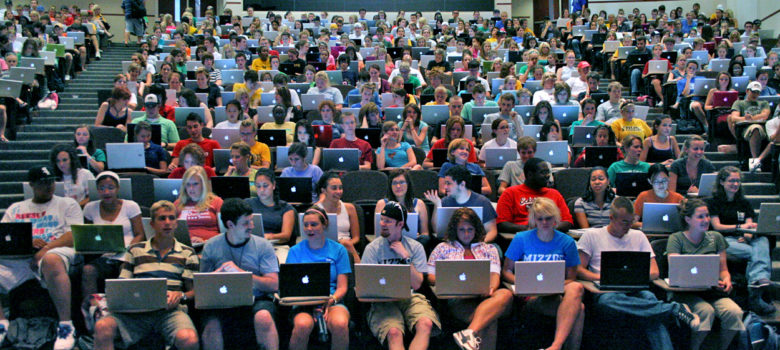Canadian copyright lobby groups have relentlessly lobbied the government to overturn decades of Supreme Court of Canada jurisprudence, seeking unprecedented restrictions on fair dealing that include eliminating it for educational institutions if a licence is available. In doing so, they have relied on a steady diet of misleading claims about the state of the law, the licensing practices of Canadian educational institutions, the importance (or lack thereof) of copying of materials in course packs, and the effects of fair dealing. This week is Fair Dealing Week, which provides an opportunity to set the record straight on Canadian copyright and education, backed by actual data on what takes place on university campuses across the country.
This blog series starts with an introduction to the issue and follows with upcoming posts on the growth of digital licensing within higher education, the gradual disappearance of course packs, the emergence of open access, the huge expenditures on transactional licensing that demonstrate a commitment to pay for materials where fair dealing does not apply, and the actual role of fair dealing (rather the false caricature painted by lobby groups). I covered many of these issues in a series five years ago, titled Misleading on Fair Dealing. This series will update the data, demonstrating that far from refusing to pay licensing fees, universities have continued to spend hundreds of millions of dollars on licensing access to materials. I am grateful to University of Ottawa law students Ephraim Barrera and Brianna Workman for their assistance on this project.
Canadian copyright has consumed hundreds of posts on this blog and been the subject of multiple books and committee hearings. For the purposes of this post, it is useful to unpack the central argument raised by copyright lobby groups. Simply put, they claim that education once paid copying licence fees to the Access Copyright collective for photocopying on campus and the creation of course packs. The groups claim they have stopped doing so as a result of 2012 copyright reforms that added “education” to the list of fair dealing purposes. These claims are grounded in multiple inaccuracies. They ignore the reality that photocopying and course packs have largely disappeared, that universities now spend hundreds of millions of dollars on licensing for digital access, and that a growing body of work is openly licensed and does not require compensation. From a legal perspective, they mislead by suggesting that the 2012 reforms are the focal point for current copyright practices and that universities have based their policies on those reforms.
While these claims have been repeated again and again for years, they simply do not withstand even mild scrutiny. First, the 2012 reform of fair dealing largely codified existing copyright law, which included private study and research as fair dealing purposes. The addition of “education” was hardly an overhaul. In fact, it fell well short of calls to adopt a “fair use” standard in Canada similar to that found in the U.S. and other countries and it was accompanied by exceptionally restrictive anti-circumvention rules. Rather, it provided the potential to fill the occasional gap where a legitimate educational use might not otherwise fall within private study or research. Given the flexible approach the court has taken on both fair dealing and in its interpretation of the meaning of “private study”, it was a very modest reform.
But you need not take my word for this. Access Copyright argued at the Copyright Board that the addition of the education purpose “did not serve to further expand fair dealing because the Supreme Court of Canada had already interpreted the exception as including that purpose.” Access Copyright’s timing is off – the Supreme Court’s 2012 decision came two weeks after the 2012 legislative reforms received royal assent – but it is right that the Canada’s highest court has consistently supported a large and liberal approach for fair dealing.
The caselaw on Canadian copyright is unequivocal. In the landmark 2004 CCH case, the court stated:
the fair dealing exception is perhaps more properly understood as an integral part of the Copyright Act than simply a defence. Any act falling within the fair dealing exception will not be an infringement of copyright. The fair dealing exception, like other exceptions in the Copyright Act, is a user’s right. In order to maintain the proper balance between the rights of a copyright owner and users’ interests, it must not be interpreted restrictively. As Professor Vaver, supra, has explained, at p. 171: ‘User rights are not just loopholes. Both owner rights and user rights should therefore be given the fair and balanced reading that befits remedial legislation.’
Despite attempts to downplay this language by copyright lobby groups, the Court re-affirmed the importance of users rights in 2012:
CCH confirmed that users’ rights are an essential part of furthering the public interest objectives of the Copyright Act. One of the tools employed to achieve the proper balance between protection and access in the Act is the concept of fair dealing, which allows users to engage in some activities that might otherwise amount to copyright infringement. In order to maintain the proper balance between these interests, the fair dealing provision ‘must not be interpreted restrictively’.
The Supreme Court did it again in 2021, rejecting Access Copyright’s mistaken theory that its tariff is mandatory and identifying multiple errors in lower court rulings involving the fair dealing analysis of copying at York University.
For copyright lobby groups to argue that university practices reflect the 2012 reforms is to ignore nearly two decades of copyright rulings at the Supreme Court in which publishers and copyright collectives have had their shaky theories of copyright law repeatedly rejected. The demands for copyright reform are therefore better understood as a call to reject decades of Supreme Court jurisprudence, not an effort to undo the 2012 drafting changes to fair dealing within the Copyright Act.
The copyright lobby groups mislead on more than just the past 20 years of Canadian copyright jurisprudence and the strong affirmation of users’ rights and fair dealing, however. Their arguments for reform also depend on claims that educational institutions have stopped paying for the use of copyright works due to fair dealing. This argument is demonstrably false. At the 2021 Supreme Court hearing in the Access Copyright v. York University case, the copyright collective’s own lawyer acknowledged that the Access Copyright licence was just one way for educational institutions to ensure they were compliant with their copyright obligations, since alternative licences were a perfectly acceptable manner of clearing rights. Over the next few days, this blog series will demonstrate that the evidence suggests that Canadian educational institutions are doing just that and that the hysterical calls for reform – complete with bizarre conspiracy theories about the Supreme Court – should be resoundingly rejected by the government.











Pingback: Canadian Copyright, Fair Dealing and Education, Part One: Setting the Record Straight | infojustice
I am grateful that you shared this knowledge with me. I truly enjoy the post that you made on your blog a lot. You have definitely impressed folks by sharing with them an article that is both helpful and engaging on your blog.
Yes, global standard is held for the respect for the citizens. The joys of thelive broadcast companies near me
are ensured for the punctuation. Matter is done for the reforms. The option is matched for the outing for the tool for the fixtures.
Pingback: Weeknote 9, 2023 – Librarian of Things
Hello, This subject very interesting. thanks for helpfull writing. this article very important and true.
thanks for helpfull writing. this article very important and true.